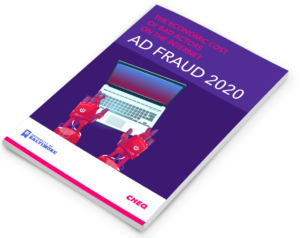Adrian J Cotterill, Editor-in-Chief
A global economic study by cybersecurity company CHEQ has revealed that marketers in the UK are set to lose GBP 1.2 billion to ad fraud by the end of 2020,
 The report detailing the full scale of ad fraud with economist Roberto Cavazos, a professor at the University of Baltimore, used the latest economic analysis, proprietary CHEQ data, and industry interviews, found that digital ad spend in the UK reached GBP 14.4 billion by the end of 2020.
The report detailing the full scale of ad fraud with economist Roberto Cavazos, a professor at the University of Baltimore, used the latest economic analysis, proprietary CHEQ data, and industry interviews, found that digital ad spend in the UK reached GBP 14.4 billion by the end of 2020.
At least GBP 1.2 billion of this is lost to ad fraud, the practice of fraudulently representing online advertising impressions, clicks, conversion or data events in order to generate revenue.
We are told that this level of fraud reflects a rise in fraud following the onset of #COVID19, with advertisers facing increases in malvertising attacks, click fraud on paid search and paid social campaigns, and resurgences in affiliate-marketing fraud and OTT programmatic ad fraud.
Several top UK brands have been hit by ad fraud: The Financial Times was allegedly hit by domain spoofing across 10 ad exchanges costing them USD s1.3 million a month.
CHEQ has itself uncovered tens of millions of pounds of ad fraud among UK enterprise clients. In 2020, the ISBA and PwC in a study of UK advertising, involving brands including HSBC, Walt Disney, and Unilever, each with 300 distinct supply chains, found that 15% of advertiser spend in the UK is completely unattributable, creating a markedly opaque supply chain.
Alongside big brands, the problem of click fraud has also affected the UK’s 5.9 million small businesses particularly particularly during COVID-19. Rates of click fraud against small businesses in the UK shot up from 13% to 21% during COVID-19. During the COVID 19 pandemic, bad actors online have been pushed to desperate measures, including unfairly competing with rivals through exhausting their PPC campaigns.
The UK is third highest in the world for ad fraud – only behind the US (expected to lose USD 11.4 billion in 2020) and China (USD 5.2 billion). On a global level, CHEQ and the University of Baltimore found that globally, losses from digital-advertising fraud (USD 35 billion USD) have overtaken global annual credit card fraud (USD 27 billion USD). This is despite the fact that only USD 333 billion USD will be spent on digital advertising in 2020, compared to USD 3.32 trillion USD in the credit card sector.
Professor Cavazos told us “Fraud is inevitable in any sector, however, the level of ad fraud is now staggering. The digital advertising sector has the unwelcome distinction of having higher fraud rates than multi-trillion-dollar sectors including healthcare, credit, and insurance. Though there has been much industry progress to stamp out fraud in digital advertising, the systemic complexity, competing interests, and sophistication of attacks particularly during a recession, have made the ecosystem a breeding ground for bad actors.”
CHEQ is a leading cybersecurity company in digital media, protecting the world’s top advertisers from ad fraud, click fraud, and other forms of invalid, non-human traffic. With offices in New-York, Tokyo, Shanghai, Tel-Aviv, and Sydney, the company’s mission is to provide security for online advertisers and restore trust in the digital ecosystem.

Follow DailyDOOH